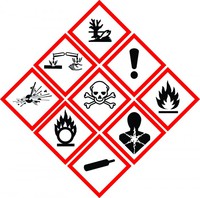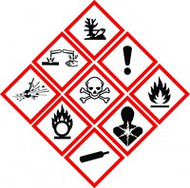Global Harmonization System – GHS And Transportation
14th May 2015
What is the Global Harmonization System? From this point forward called GHS, where did it come from? And what does it have to do with transportation?
I’m afraid I have to go deep here to provide a background and better understanding. Ever wonder why we have UN Spec Packaging? What does that symbol, the UN with a circle around it mean? Where does it come from? The UN stands for the United Nations. Yes that, United Nations. The one in New York City. The one that sets worldwide standards on everything from humanitarian relief to do’s and don’ts of war.

At The United Nations, there are many departments. One of them is called, The United Nations Economic and Social Council. Within the UNCED, there’s a committee, the name of the committee is, The Committee of Experts on the Transport of Dangerous Goods. They’ve been around a long time and have set today’s standards for everything when it comes to transporting dangerous goods. Even the packaging, and that is what the UN with a circle around it on your box means. It means that box has been manufactured and successfully passed the tests and criteria The Committee of Experts have been laying down for years.
Now these experts have been going at it for a long time – back to the 1950’s! They’ve had moderate success standardizing the way we ship dangerous goods in transportation, but they’ve always been just as concerned with hazardous materials in the workplace. So in 1992, GHS was born. They called it, ready? “A Globally Harmonized Classification and Compatible Labeling System, including Material Safety Data Sheets and easily understandable Symbols.” Whew! And back in 1992, they wanted it implemented by the year 2000. Better late than never – right?
So we have a transportation baby and a workplace baby – they are apples and oranges. Everything we’ve been taught about shipping hazardous materials remains the same. The GHS requirements apply to manufacturers of dangerous goods and those same dangerous goods in the workplace. It just so happens that because these babies come from the same family, there is some common DNA.

In transportation we have Hazard Warning Labels which represent the nine different Hazard Classes. In the workplace (GHS) we have what are called Pictograms. Unfortunately, these Pictograms carry the same DNA of our beloved Hazard Warning Labels but are not the same. Pictograms represent the material is regulated inside the workplace only. Hazard Warning Labels represent the material is regulated in transportation. They are not interchangeable.
What does bond these two babies together? Most prominently, is the Material Safety Data Sheet (MSDS) which is now being called, the Safety Data Sheet or SDS. In the transportation world, there is a requirement to provide a document which describes the dangerous materials with a Proper Shipping Name and UN Number and describe its dangerous properties and to describe what to do if the material doesn’t behave. Alas, the SDS, that’s exactly what it does do. So the SDS, although not specifically required by the regulations, is fast becoming a very common tool in the transport world to comply with Emergency Response Information requirements.
The GHS babies were introduced years ago and we were told they’d be crawling this year in 2015 and walking by next year 2016. DGI has a growth chart at http://dgitraining.com/ghs-training-1/
We've been coddling this baby since 2013. She is up and crawling now, and will be walking and running by the end of the year.
One baby plays inside and one baby plays outside.
DGI Training.


